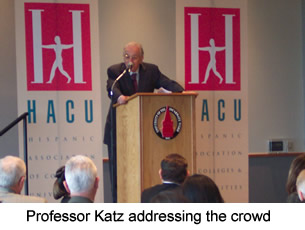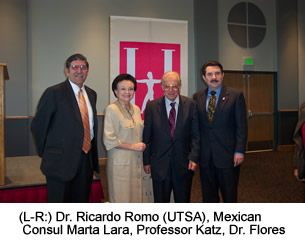For immediate release
Hispanic leaders, experts gather in San Antonio
to mark anniversary of Mexican Revolution
SAN ANTONIO, Texas - National historians and the leadership of the Hispanic higher education community met in San Antonio to mark the November 20 anniversary of the Mexican Revolution and discuss its continuing impact on Hispanics in the Americas.
The Hispanic Association of Colleges and Universities (HACU), in partnership with the Consulate General of Mexico in San Antonio, hosted a panel session and keynote luncheon on "The Mexican Revolution and its Effects on the United States" on November 19 at the University of the Incarnate Word, a HACU member institution.
"The importance of the Mexican Revolution and its continuing implications for U.S.-Mexico relations is a topic that we were honored to highlight at this special event," said HACU President and CEO Antonio R. Flores.
"Certainly, celebrating our shared heritage can go far to promote cross-border understanding and enlightenment, especially for the United States, where Hispanics of Mexican origin have contributed so dramatically to making Hispanics our country's largest ethnic population," Flores, a native of Mexico, said.
 Nationally
renowned historian and author Friedrich Katz, co-director of the Mexican Studies
Program at the University of Chicago, followed a panel discussion featuring
Hispanic higher education leaders from the University of the Incarnate Word,
Trinity University, and San Antonio College.
Nationally
renowned historian and author Friedrich Katz, co-director of the Mexican Studies
Program at the University of Chicago, followed a panel discussion featuring
Hispanic higher education leaders from the University of the Incarnate Word,
Trinity University, and San Antonio College.
Even the neighboring United States, Katz said, "underestimated the strength of Mexican revolutionary nationalism" in a presentation that focused on Pancho Villa's raid on Columbus, NM. It was this raid that led to U.S. military involvement with General John Pershing's pursuit of Villa until Pershing's recall to the U.S. to serve in World War I.
The Mexican Revolution of 1910 would lay the foundation for the formation of Mexico's modern political parties and its constitution. The revolution to overthrow Mexican dictator Porfirio Diaz would also make famous the names of revolutionaries such as Pancho Villa and Emiliano Zapata.
The revolution also had a San Antonio connection. When Francisco I. Madero fled Mexico in 1910 after being arrested, he came to San Antonio. In San Antonio, he developed the "Plan de San Luis Potosi" calling for a revolution to end the dictatorship of Porfirio Diaz.
 "If
there's any city that can claim a link to the Mexican Revolution, it's San Antonio,"
said Ricardo Romo, president of the University of Texas at San Antonio and a
member of the HACU Governing Board.
"If
there's any city that can claim a link to the Mexican Revolution, it's San Antonio,"
said Ricardo Romo, president of the University of Texas at San Antonio and a
member of the HACU Governing Board.
Earlier, panelists discussed conditions of poverty and political upheaval that
would lead to a wave of immigration to the United States.
The day's panel session was moderated by Gilberto Hinojosa, Dean of Graduate Studies at the University of the Incarnate Word. Panelists included: Hinojosa, Trinity University professor Belinda Roman, and San Antonio College professor Juanita Luna Lawhn.
HACU, the nation's leading voice for the Hispanic higher education community, represents more than 390 colleges and universities throughout the Americas and in Spain. In the United States, HACU member institutions collectively serve more than two-thirds of all Hispanic higher education students. Every college and university in San Antonio is a member of HACU.
For more information, contact HACU's national headquarters in San Antonio, Texas, at (210) 692-3805, Ext. 3214. Or visit www.hacu.net.
